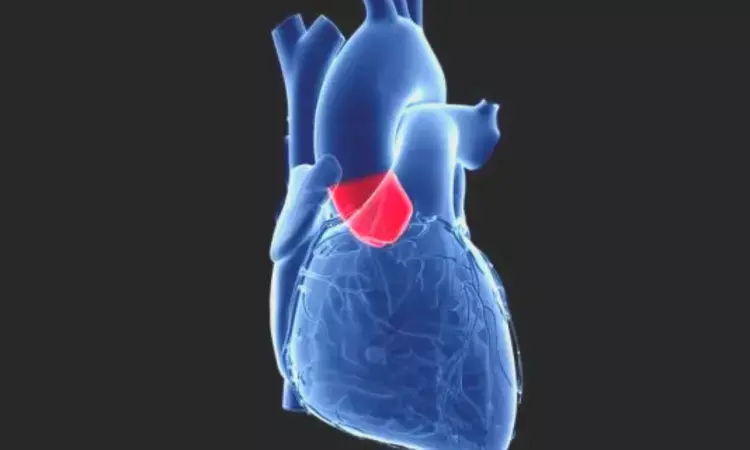- Home
- Medical news & Guidelines
- Anesthesiology
- Cardiology and CTVS
- Critical Care
- Dentistry
- Dermatology
- Diabetes and Endocrinology
- ENT
- Gastroenterology
- Medicine
- Nephrology
- Neurology
- Obstretics-Gynaecology
- Oncology
- Ophthalmology
- Orthopaedics
- Pediatrics-Neonatology
- Psychiatry
- Pulmonology
- Radiology
- Surgery
- Urology
- Laboratory Medicine
- Diet
- Nursing
- Paramedical
- Physiotherapy
- Health news
- Fact Check
- Bone Health Fact Check
- Brain Health Fact Check
- Cancer Related Fact Check
- Child Care Fact Check
- Dental and oral health fact check
- Diabetes and metabolic health fact check
- Diet and Nutrition Fact Check
- Eye and ENT Care Fact Check
- Fitness fact check
- Gut health fact check
- Heart health fact check
- Kidney health fact check
- Medical education fact check
- Men's health fact check
- Respiratory fact check
- Skin and hair care fact check
- Vaccine and Immunization fact check
- Women's health fact check
- AYUSH
- State News
- Andaman and Nicobar Islands
- Andhra Pradesh
- Arunachal Pradesh
- Assam
- Bihar
- Chandigarh
- Chattisgarh
- Dadra and Nagar Haveli
- Daman and Diu
- Delhi
- Goa
- Gujarat
- Haryana
- Himachal Pradesh
- Jammu & Kashmir
- Jharkhand
- Karnataka
- Kerala
- Ladakh
- Lakshadweep
- Madhya Pradesh
- Maharashtra
- Manipur
- Meghalaya
- Mizoram
- Nagaland
- Odisha
- Puducherry
- Punjab
- Rajasthan
- Sikkim
- Tamil Nadu
- Telangana
- Tripura
- Uttar Pradesh
- Uttrakhand
- West Bengal
- Medical Education
- Industry
Structural valve deterioration tied to worse outcomes; favorable for TAVI versus surgery patients: JAMA

Five-year structural valve deterioration is associated with worse clinical outcomes, favoured patients with a self-expanding TAVR placed instead of surgery.
USA: In patients undergoing self-expanding TAVI (transcatheter aortic valve implantation) versus surgery, a recent JAMA Cardiology study showed a lower structural valve deterioration rate (SVD) rate at five years. Also, doppler echocardiography was shown to be a helpful tool for SVD detection, which was linked with worse clinical outcomes.
Considering the poor understanding of the frequency and clinical importance of structural valve deterioration in patients undergoing self-expanding TAVI or surgery, the researchers aimed to investigate the 5-year incidence, clinical outcomes, and predictors of hemodynamic SVD in this population.
Daniel O'Hair, Cardiovascular Service Line, Boulder Community Health, Boulder, Colorado and colleagues addressed the question, what are the 5-year outcomes, incidence and predictors of SVD following supra-annular, self-expanding transcatheter aortic valve implantation, or surgery from large-scale randomized clinical trials?
The researchers pooled data from the SURTAVI (n = 1484) and CoreValve US High-Risk Pivotal (n = 615) randomized clinical trials (RCTs) for the post hoc analysis. The data pooling was supplemented by the CoreValve Continued Access Study (n = 2178) and CoreValve Extreme Risk Pivotal trial (n = 485). The study included patients with severe aortic valve stenosis considered at intermediate or increased risk of 30-day surgical mortality. Data analysis was done from December 2021 to October 2022, and the collection was from December 2010 to June 2016.
Patients were randomized to surgery or self-expanding TAVI in the RCTs or underwent TAVI for clinical indications in nonrandomized studies.
SVD incidence through 5 years was assessed from the RCTs (primary endpoint). Factors linked with CVD and its association with clinical outcomes were investigated for the pooled RCT and non-RCT populations. SVD was described as (1) an increase in the mean gradient of 10 mm Hg or higher from discharge or at 30 days to the last echocardiography with a final mean gradient of 20 mm Hg or higher or (2) new-onset modest or severe intraprosthetic aortic regurgitation or a rise of 1 grade or more.
The authors reported the following findings:
- Of 4762 included patients, 54.7% were male, and the mean age was 82.1 years.
- The study included a total of 2099 RCT patients, comprising those who received TAVI (n=1128) and who received surgery (n=971) and non-RCT patients who received TAVI (n=2663).
- The cumulative incidence of SVD treating the death as a competing risk was lesser in patients undergoing TAVI versus surgery (TAVI, 2.20%; surgery, 4.38%; hazard ratio [HR], 0.46). This lower risk was most prominent in smaller annuli patients (23 mm diameter or smaller; TAVI, 1.32%; surgery, 5.84%; HR, 0.21).
- SVD was linked with increased 5-year all-cause mortality (HR, 2.03), cardiovascular mortality (HR, 1.86), and valve disease or worsening heart failure hospitalizations (HR, 2.17).
- SVD predictors were developed from multivariate analysis.
To conclude, structural valve deterioration is associated with worse outcomes, and self-expanding TAVI is associated with a lower rate of SVD compared to surgery.
Reference:
O'Hair D, Yakubov SJ, Grubb KJ, et al. Structural Valve Deterioration After Self-Expanding Transcatheter or Surgical Aortic Valve Implantation in Patients at Intermediate or High Risk. JAMA Cardiol. Published online December 14, 2022. doi:10.1001/jamacardio.2022.4627
Dr Kamal Kant Kohli-MBBS, DTCD- a chest specialist with more than 30 years of practice and a flair for writing clinical articles, Dr Kamal Kant Kohli joined Medical Dialogues as a Chief Editor of Medical News. Besides writing articles, as an editor, he proofreads and verifies all the medical content published on Medical Dialogues including those coming from journals, studies,medical conferences,guidelines etc. Email: drkohli@medicaldialogues.in. Contact no. 011-43720751


